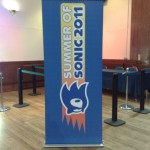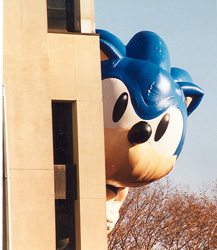 Saturday, June 25th. A thousand-strong horde of Sonic fans descends upon the Camden Centre in London, to celebrate a video gaming icon with music, games, laughs and chilli dogs. So far, so Summer of Sonic, but this was the 20th anniversary show so there had to be something just a bit special going on, and blimey did they ever deliver on that. How? By getting Yuji Naka and Takashi Iizuka to drop by London to enjoy the festivities, do some signings and some Q&A sessions. That is pretty hard to top, ladies and gents, especially when fans were able to quiz the pair on Madonna, the joint American/Japanese development of Sonic 2, and dat barrel. However, Sonic Retro was also able to get a little more into the bargain and snag an interview slot with Naka and Iizuka. Exciting? I thought so.
Saturday, June 25th. A thousand-strong horde of Sonic fans descends upon the Camden Centre in London, to celebrate a video gaming icon with music, games, laughs and chilli dogs. So far, so Summer of Sonic, but this was the 20th anniversary show so there had to be something just a bit special going on, and blimey did they ever deliver on that. How? By getting Yuji Naka and Takashi Iizuka to drop by London to enjoy the festivities, do some signings and some Q&A sessions. That is pretty hard to top, ladies and gents, especially when fans were able to quiz the pair on Madonna, the joint American/Japanese development of Sonic 2, and dat barrel. However, Sonic Retro was also able to get a little more into the bargain and snag an interview slot with Naka and Iizuka. Exciting? I thought so.
Now if you will, allow me to set the scene. Things are behind schedule and everyone is hot and totally knackered, a fact that fellow attendees will attest to. We’re now down to the last interview slot of the day, and another site needs to cram into the session too. We finally get to head in as Jun Senoue takes to the stage to wow everyone downstairs. Still, I know things are going to be at least a little bit good when we’re asked what sites we came from – the mention of our site causes an “Ah, Sonic Retro!” from Iizuka, as he tilts his head back and smiles with a mixture of recognition and amusement. If you were ever in doubt of Retro’s reach, dear reader, that should give you a rough idea of our place in the grand scheme of things.
Then, with little time to spare and more questions than I can possibly ask, we get down to business.
Retro: Naka-san, you joined Sega around the time of its first real console releases, having worked on the SG-1000 and Sega My Card series back in the mid-80s. What was it like to see Sega become a video game publisher that was known all over the world?
Naka: At the beginning, Sega’s real catalyst for success was the arcade, and Sonic pulled it along and really built upon that. Also, the fact that we had hardware and were a first party helped to give us that status in the market, as a global name. So, I feel really happy to be able to be involved, really lucky. It’s really amazing that something created in Haneda, which is not at the centre of Tokyo, sold worldwide.
Hit the post break for the rest of the interview!
